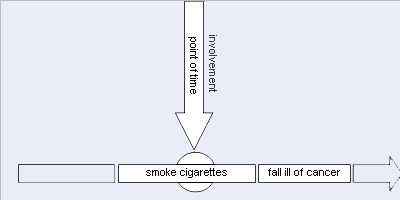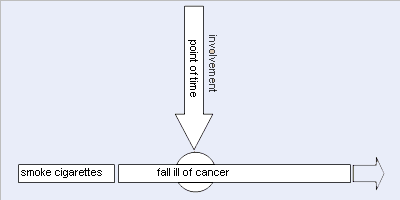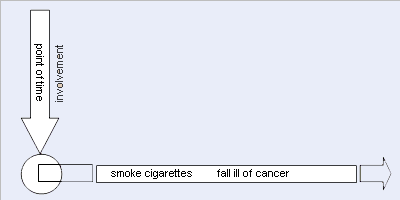
| 18.2.3 Comparison of the two above |
We have just seen that the tenses in the reported clause are to be adjusted, if the introductory verb is in one of the following past tenses:
| Past tenses |
| imparfait passé composé passé simple plus-que-parfait conditionnel passé |
The following picture shows the relation between the point of speaking and the mental involvement.
 |
| We have the following example |
| Ils ont coupé l' arbre = They cut the tree. |
| before the involvement: Il a cru, qu' ils avaient coupé l' arbre. = He thought that they hasd cut the tree. Il a dit, qu' ils avaient coupé l' arbre. = He said that they had cut the tree. same time with the involvement: Il a cru, qu' ils coupaient l' arbre. = He thought that they cut the tree. Il a dit, qu' ils coupaient l' arbre. = He said that they cut the tree. after the involvement: Il a cru, qu' ils couperaient l' arbre. = He thought that they would cut the tree. Il a dit, qu' ils couperaient l' arbre. = He said that they would cut the tree. |
There is one specialty to be taken into account:
We have already mentioned before that the French passé composé has taken the function of the passé simple. Therefore, it is a past tense, even though in other languages it does not belong to the group of past tenses. For instance in English the present perfect is a present tense. However, the form has the function of a past tense, there is no doubt about this. So, we cannot say otherwise.
Is the point of involvement in the present tense or not mentioned then there is no need to adjust the tenses of the reported clause.
| Present tenses are |
| présent futur simple futur composé conditionnel présent |
Then the example will be unchanged, whatever might be the introductory phrase (I think, he assumes etc.).
| Example |
| Ils ont coupé l' arbre = They cut the tree. |
For the completeness of the repetition, please see the following graph.
 |
| 1.c) Reported speech: He says that you smoke so many cigarettes that you will fall ill of cancer. 1.c) Sequence of tenses: I think that you smoke so many cigarettes that you will fall ill of cancer. |
 |
| 2.c) Reported speech: He says that you have smoked so many cigarettes that you fall ill of cancer. 2.c) Sequence of tenses: I think that you have smoked so many cigarettes that you fall ill of cancer. |
 |
| 3.c) Reported speech: He says that, if you will smoke so many cigarettes that you will fall ill of cancer. 3.c) Sequence of tenses: I think that, if you will smoke so many cigarettes that you will fall ill of cancer. |
| contact privacy statement imprint |